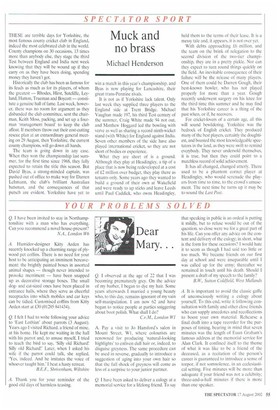Muck and no brass
Michael Henderson
THESE are terrible days for Yorkshire, the most famous county cricket club in England, indeed the most celebrated club in the world. County champions on 30 occasions, 13 times more than anybody else, they stage the third Test between England and India next week knowing that they will be wound up if they carry on as they have been doing, spending money they haven't got.
Historically the club has been as famous for its feuds as much as for its players, of whom the greatest — Rhodes, Hirst, Sutcliffe, Leyland, Hutton, Trueman and Boycott — constitute a genuine hall of fame. Last week, however, there was no room for argument as they disbanded the club committee, sent the chairman, Keith Moss, packing, and set up a fourman 'management board' to keep the club afloat. lf members throw out their cost-cutting rescue plan at an extraordinary general meeting on 29 August, then Yorkshire, the current county champions, will go down all hands.
The team is going down in any case. When they won the championship last summer, for the first time since 1968, they fully expected to retain the title this season. But David Byas, a strong-minded captain, was pushed out of office to make way for Darren Lehmann, the club's brilliant Australian batsman, and the consequences of that putsch are evident. Yorkshire have yet to win a match in this year's championship. and Byas is now playing for Lancashire, their great trans-Pennine rivals.
It is not as if Yorkshire lack talent. Only last week they supplied three players to the England side at Trent Bridge. Michael Vaughan made 197, his third Test century of the summer, Craig White made 94 not out, and Matthew Hoggard led the bowling with verve as well as sharing a record ninth-wicket stand (with White) for England against India. Seven other members of the side have also played international cricket, so they are not short of bodies or experience.
What they are short of is a ground. Although they play at Headingley, a tip of a place that is now being redeveloped at a cost of £2 million over budget, they play there as tenants only. Some years ago they wanted to build a ground of their own at Wakefield and were ready to up sticks and leave Leeds until Paul Caddick. who owns Headingley, held them to the terms of their lease. It is a messy tale and, it appears, it is not over yet.
With debts approaching £6 million, and the team on the brink of relegation to the second division of the two-tier championship, they are in a pretty pickle. Nor can they expect to turn round things quickly on the field. An inevitable consequence of their failure will be the release of many players. One of them could be Darren Gough, their best-known bowler, who has not played properly for more than a year. Gough recently underwent surgery on his knee for the third time this summer and he may find that his Yorkshire career is a thing of the past when, or if, he recovers.
For cricket-lovers of a certain age, all this will sound bewildering. Yorkshire was the bedrock of English cricket. They produced many of the best players, certainly the doughtiest, and boasted the most knowledgeable spectators in the land, as they were swift to remind everybody. They never undersold themselves, it is true, but then they could point to a matchless record of solid achievement.
It has all changed, changed utterly. There used to be a phantom cornet player at Headingley, who would serenade the players from time to time, to the crowd's amusement. The next time he turns up it may be to sound the Last Post.






























































 Previous page
Previous page